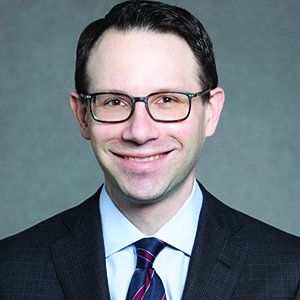In This Section

Phil Ratner
Partner, Paul Hastings
40 Under 40 Category: Legal Services
Phil Ratner is a partner in the Finance and Restructuring practice of Paul Hastings and is based in the firm’s New York office. He focuses on the representation of credit funds, alternative lenders, private equity sponsors and their portfolio companies, corporations, and investment and commercial banks on a diverse range of complex secured and unsecured corporate finance transactions. Phil regularly advises clients on leveraged buyouts and acquisition financing, direct and syndicated lending, bridge, mezzanine and second lien loans, dividend recapitalizations, working capital facilities, asset-based lending, and cross-border structuring. He also has substantial experience with special situations and distressed debt transactions, including Chapter 11 reorganizations, out-of-court restructurings, and strategic lending transactions. Phil is a graduate of Brown University and Columbia Law School.
What is the best professional advice you have been given and how have you implemented it?
Don’t make long-term decisions based on short-term input. That sounds simple, but it took me some time to appreciate the importance of the long view. I have come to realize that it serves my clients well to step back and consider their long-term best interests rather than just the perceived immediate gains. This approach also applies in other professional as well as personal matters. I keep coming back to this basic thought, particularly in the heat of difficult situations.
Did you change the way you approach work while working remotely during the pandemic? Have these habits stayed with you as we emerge from the crisis?
The pandemic forced all of us to work remotely, away from the easy collaboration of the office. Working in that changed environment underscored the importance of professional interaction and the need to stay connected with colleagues to best serve our clients, maintain our spirit of teamwork, and enjoy casual personal interaction. It also brought into focus the need to appreciate and be respectful of the many conflicting demands (personal as well as professional) on each person’s time. These lessons will continue to apply as we return to the office and at long last see colleagues and clients in person. In addition, working remotely presented many logistical challenges and the absence (or unpredictability) of uninterrupted work time. This forced me to focus on efficient scheduling, keeping perspective and maintaining a sense of humor. It will be important to keep all this in mind when we return to the relative quiet of the office and the home-front distractions are not there.
How do you define a good leader?
An effective leader is one who leads by example, providing clear direction and guidance to create an environment that encourages open communication, is respectful of different viewpoints, and engages team members in the big picture. In my view, the key to leadership is building and maintaining a team that shares a vision and takes pride in its accomplishments. A big part of the job of a leader is to develop junior lawyers into new leaders. Great leaders make that a central point of attention and celebrate the successes of those with whom they work.
What advice do you normally give to the junior talent you mentor?
I frequently remind junior lawyers that doing a great job on each assignment is essential, but is only the starting point in their professional development. I encourage them to ask questions and strive to understand not only what they are being asked to do, but why it is being done and how it fits in to the overall matter. In that way, they can see beyond the specific task to understand our clients’ objectives and what it is that we, as lawyers, are doing for our clients. The law is, after all, something of an apprenticeship profession, so asking questions and being proactive will help them become effective problem-solvers and make the most of the tremendous opportunities offered to them. I also remind them that this is a long process, and that there’s no substitute for the investment they make in themselves as they develop as lawyers.
Professional Development Courses
- Live online classes for ABL and Factoring professionals
- On Demand classes in Appraisals, Factoring, Legal, Workout & Bankruptcy
